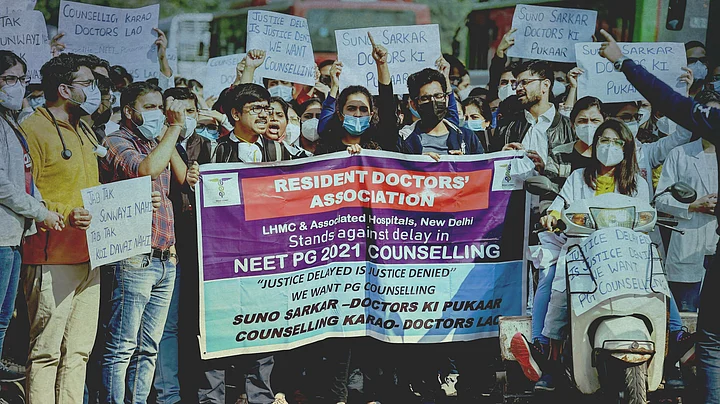After conducting a day-long hearing on petitions challenging the validity of EWS quota in postgraduate medical admissions and the Centre's argument favouring the quota, the Supreme Court on Thursday, 6 January, said there is a situation, where in national interest, the counselling has to begin, which was also a key demand of protesting resident doctors.
A bench comprising Justices DDY Chandrachud and AS Bopanna said:
"We are in a situation, where in the national interest, the counselling has to begin."Supreme Court
Solicitor General Tushar Mehta, representing the Centre, argued that all candidates eligible for the EWS quota, as per existing criteria, have got their certificates for registration and added that seats in all government colleges have been increased to accommodate the EWS quota.
"So, this will not harm the chances of general category students...," he added.
Mehta also clarified that super-speciality courses have no reservation and none of the judgments remotely suggest that there cannot be reservation in PG courses.
On the aspect of the EWS quota, he said there was a study, application of mind, and wide consultation when the government decided to fix the Rs 8 lakh income limit.
He submitted: "We are not in the exercise to find who is poor. The Constitution uses the word economically weaker section... whether economically weaker meritorious students can compete with other students, afford tuition etc, are the considerations."
He clarified that income in the present case is family income and if there are three members in the family earning Rs 3 lakh per year, then their income would be Rs 9 lakh and they would not come under the EWS category.
Senior advocate Arvind Datar, representing some petitioners, argued that there was no proper study undertaken to arrive at the Rs 8 lakh income limit and cited income disparities in various states.
He said applying the Rs 8 lakh limit uniformly across the country is arbitrary, and this quota should be deferred to next year, instead of applying this year.
Advocate Archana Pathak Dave, appearing for The Federation of Indian Doctors, said: "That every year an estimated 45,000 candidates are inducted as postgraduate doctors through the NEET-PG examination. However, in the year 2021, the said process of induction of postgraduate doctors into the medical workforce was hindered due to the outbreak of Covid-19 pandemic and the consequent delay in the holding of the NEET-PG examination."
In an intervention plea, the federation of doctors urged the top court to allow commencement of counselling.
Senior advocate Shyam Divan, representing some of the doctors who took the exam, argued that postgraduate admissions must be completely merit-based and reservation must be minimal and referred to Supreme Court judgments which hold that there should be no reservation in superspeciality courses.
The Centre has accepted the report of a three-member panel constituted to revisit the EWS criteria. The panel, in its report, said: "Firstly, the EWS' criteria relates to the financial year prior to the year of application whereas the income criterion for the creamy layer in OBC category is applicable to gross annual income for three consecutive years."
The panel added: "Secondly, in case of deciding the OBC creamy layer, income from salaries, agriculture, and traditional artisanal professions are excluded from the consideration whereas the Rs 8 lakh criteria for EWS includes that from all sources, including farming. So, despite being the same cut-off number, their composition is different and hence, the two cannot be equated."
After hearing the parties in the matter, the top court reserved its judgment on the petitions challenging the 27 percent reservation for Other Backward Classes (OBC) and 10 percent reservation for EWS in all-India quota seats for postgraduate medical courses.
As many as 15 percent seats in MBBS and 50 percent seats in MS and MD courses are filled through all-India Quota from the candidates selected through the NEET.
